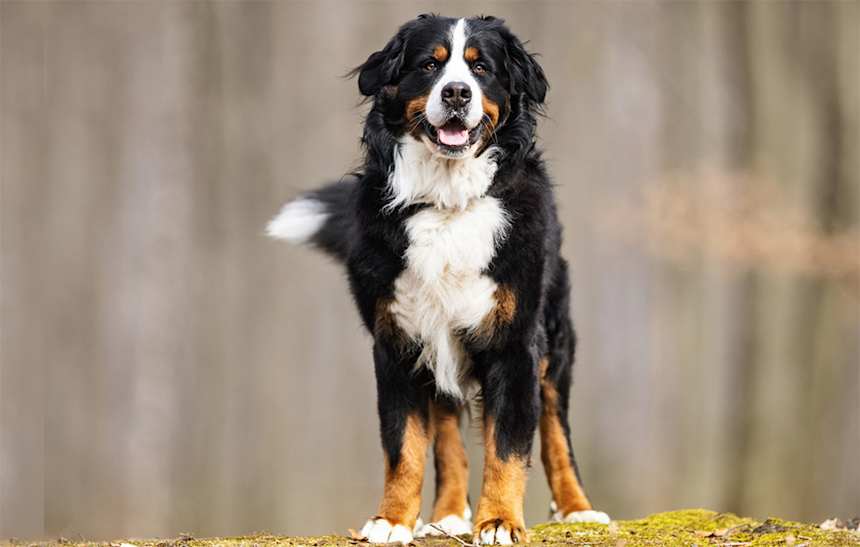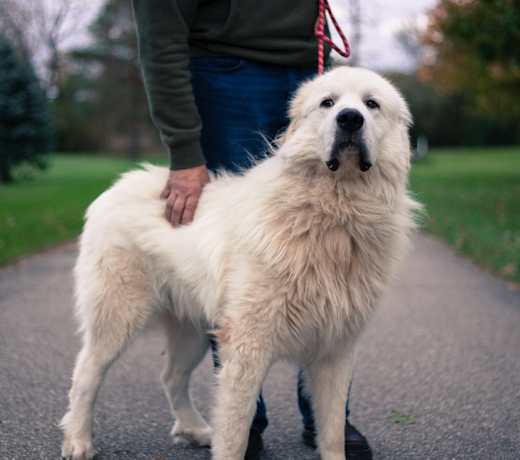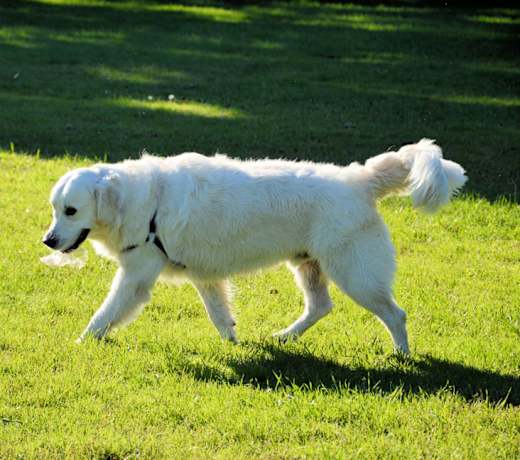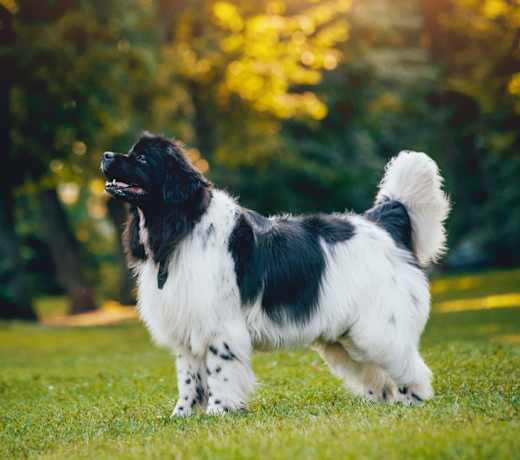Bernese Mountain Dogs are between 23 and 26 inches tall at the shoulder and typically weigh between 70 and 123 pounds.
Bernese Mountain Dog
Breed Type: Working
Common nicknames: Berner
Coat: Double
Hypoallergenic: No, they will likely trigger allergies.
Temperament: Affectionate, gentle, loyal, patient
Life expectancy: 7-10 years
Color & patterns:

The Bernese Mountain Dog is one of the most lovable dog breeds out there, known for their friendly dispositions and gentle natures. This breed is a large one, with males typically weighing in at around 80 to 115 pounds and standing 25 to 27.5 inches tall, while females are usually between 70 and 95 pounds and stand 23 to 26 inches tall. Their size alone is enough to make them stand out, but their tri-color coats (black, white, and rust) and soulful eyes truly make them irresistible. Aside from their size and looks, Bernese Mountain Dogs, also called "Bernies," are known for being great family pets. They are affectionate, loyal, and eager to please, making them wonderful pets for children and adults alike. While they may be a bit stubborn at times, with proper training and socialization, they can make excellent obedience and agility dogs. The Bernese Mountain Dog also has a moderate energy level, so they are happy to go for a long hike or just lounge around with their humans.
Bernese Mountain Dog characteristics
Learn about about Bernese Mountain Dog basics like their fur colors, shedding levels, how much grooming they need, and other Bernese Mountain Dog facts.
Average height
23-26 inches (58.4-66.0cm)
Average weight
70-123 pounds (31.8-55.8 kg)
Average lifespan
7-10 years
Exercise needs
Grooming needs
Full-grown size
Good with cats
Good with kids
Training Aptitude
Do Bernese Mountain Dogs drool?
No, Bernese Mountain Dogs do not drool excessively compared to some breeds like Saint Bernards or Bloodhounds. But Berners can drool occasionally, especially when they are hot and panting or after eating or drinking.
Do Bernese Mountain Dogs shed?
Yes, Bernese Mountain Dogs shed. They have thick double coats with a longer outer coat and a dense undercoat, and are considered moderate to heavy shedders. To manage your Berner’s shedding and prevent matting, brush the coat several times a week. During the heavier shedding seasons, which typically occur in the spring and fall, you’ll need more frequent brushing is necessary to control the amount of hair around the house.
What colors do Bernese Mountain Dogs come in?
Bernese Mountain Dogs are tri-colored (black, white, and rust). Black is the dominant color, covering most of the body, including the back, sides, and legs. White markings typically appear on the chest, muzzle, paws, and tail tip. Rust markings are usually found over the eyes, on the cheeks, chest, legs, and under the tail.
How long do Bernese Mountain Dogs live?
Bernese Mountain Dogs generally live between seven and 10 years. However, individual lifespans can vary based on factors such as genetics, diet, exercise, healthcare, and overall lifestyle. Providing proper care, regular veterinary check-ups, a balanced diet, and maintaining a healthy weight can contribute to helping dogs of all breeds live long and healthy lives.
When do Bernese Mountain Dogs stop growing?
Bernese Mountain Dogs reach their full height between 12 and 18 months old. However, they continue to fill out and gain muscle mass until they are about two to three years old.
How do you pronounce Bernese Mountain Dog?
Bernese Mountain Dog is pronounced ber-neez moun-tuhn dog.
Are Bernese Mountain Dogs herders?
No, Bernese Mountain Dogs are not herding dogs. Bernese Mountain Dogs were all-purpose farm dogs, which meant they did a little of everything, including herding. They have a strong instinct to work and please their people, but they do not have the same natural herding instincts and drive as breeds like Border Collies or Australian Shepherds.
Bernese Mountain Dog history
Learn about where the Bernese Mountain Dog came from.
What were Bernese Mountain Dogs bred for?
Bernese Mountain Dogs were traditionally bred as working dogs on farms. They pulled carts loaded with farm produce to market, herded livestock (such as cows, sheep, and goats), and acted as watchdogs, alerting farmers to potential threats or intruders.
Where are Bernese Mountain Dogs from?
Bernese Mountain Dogs are from Switzerland, specifically the canton of Bern, which is in the Swiss Alps. They are one of the four breeds of Swiss farm dogs called Sennenhunds. By the late 1800s, Bernese Mountain Dogs had almost disappeared in favor of other mountain dogs, but an enthusiast named Franz Schertenleib re-popularized them.
Bernese Mountain Dog temperament
Learn about about the Bernese Mountain Dog temperament and how well they fit into your lifestyle, home environment, and family.
Are Bernese Mountain Dogs good with kids?
Yes, Bernese Mountain Dogs are good with kids. Often described as gentle giants, Berners are calm and patient with children.
As with any dog breed, however, parents should always supervise interactions between Bernese Mountain Dogs and children to ensure safety and prevent potential accidents. Teaching children how to approach, pet, and interact with dogs in a gentle and respectful manner is crucial, as is teaching dogs how to interact gently with children.
Are Bernese Mountain Dogs good family dogs?
Yes, Bernese Mountain Dogs are good family dogs. They are affectionate, gentle, and loyal companions who form strong bonds with their family members, and they enjoy participating in family activities and spending time with their human companions. Their calm and patient nature makes them well-suited for families with children, although it’s important for pet parents to teach their dogs how to gently interact with children and supervise all interactions with them to make sure everyone stays safe. It’s also crucial for parents to teach kids how to gently interact with all dog breeds and recognize when they need space.
Are Bernese Mountain Dogs protective?
Yes, Bernese Mountain Dogs are protective of their families and homes. They are loyal and devoted companions who often form strong bonds with their people and are naturally inclined to protect them from potential threats or intruders.
Berners are generally friendly and gentle in nature, but their protective instincts can be activated if they perceive a threat or if they sense that their family is in danger. Their size, strength, and deep bark serve as deterrents to intruders, and their alert and watchful nature makes them excellent watchdogs.
Bernese Mountain Dogs should not be overly aggressive or reactive without reason. Proper socialization, training, and positive reinforcement are essential to ensure that they can distinguish between friend and foe and respond appropriately to different situations.
Are Bernese Mountain Dogs easy to train?
Yes, Bernese Mountain Dogs are easy to train thanks to their intelligence and eagerness to please. They respond well to praise, treats, and rewards, and they enjoy spending time with their people and participating in training sessions.
However, training any dog takes substantial time and effort, regardless of breed. Although they are intelligent, Bernese Mountain Dogs can also be sensitive, independent, and have their own ideas about things, which requires patience and creativity when training. They might not always respond instantly to commands or be as consistently obedient as some other breeds. With patience, persistence, and positive reinforcement, they can become well-behaved companions.
Do Bernese Mountain Dogs bark a lot?
No, Bernese Mountain Dogs are not usually excessive barkers, but they can bark to alert their pet parents to potential intruders or unusual noises. Berners might bark more if they are bored, lonely, or anxious. Proper socialization, training, and mental stimulation can help prevent excessive barking.
Are Bernese Mountain Dogs good with cats?
Yes, most Bernese Mountain Dogs are good with cats, especially if they are introduced and socialized with them at a young age. However, individual personalities and temperaments can vary among dogs, so not all Berners Bernese Mountain Dogs are good with cats. Some might be more tolerant and accepting of cats than others. It’s essential to monitor all interactions between Berners and cats, and to provide them with guidance, training, and a proper environment to foster a peaceful relationship.
Are Bernese Mountain Dogs good with other dogs?
Yes, most Bernese Mountain Dogs are good with other dogs if they are properly socialized and introduced to other dogs from a young age. Their calm and gentle nature often makes them well-suited for multi-dog households, and they are usually accepting of other dogs’ company. Individual temperament and personality can vary among Bernese Mountain Dogs, and some might be more reserved or cautious around unfamiliar dogs.
Are Bernese Mountain Dogs smart?
Yes, Bernese Mountain Dogs are smart dogs. Berners are capable of learning a variety of tasks and commands. They are quick learners and eager to please their pet parents, which can make them relatively easy to train when using positive reinforcement methods. Berners have a good memory and can learn a variety of commands, tricks, and tasks with consistent training and practice.
Are Bernese Mountain Dogs good for first-time pet parents?
Bernese Mountain Dogs are wonderful companions for first-time pet parents due to their gentle, affectionate, and loyal nature. However, there are some things to consider before bringing a Berner into your home, including that, as a large breed, they require plenty of space to move around and regular exercise to stay healthy and happy, so be prepared to provide daily walks, playtime, and mental stimulation to meet their exercise needs. Berners thrive in homes where they are considered part of the family and can spend time with their people. They are not suited for living outdoors or being left alone for long periods.
Do Bernese Mountain Dogs like water?
Yes, many Bernese Mountain Dogs enjoy playing in water and swimming. Their thick double coat is water-resistant, which can help them stay buoyant and warm in the water. Swimming is a great form of exercise for Bernese Mountain Dogs, especially during hot weather, as it helps them stay cool and burn off excess energy.
However, not all Berners are natural swimmers, and some may be more cautious or hesitant around water. Introduce your Bernese Mountain Dog to water gradually and in a controlled manner to ensure that they feel comfortable and safe. Positive reinforcement, encouragement, and patience can help build your Berner’s confidence and enjoyment of water activities.
Do Bernese Mountain Dogs like the cold?
Yes, Bernese Mountain Dogs like cold weather and often enjoy cooler temperatures due to their dense, water-resistant double coat, which provides excellent insulation and protection against the cold, making them well-adapted to colder climates.
Although Berners can tolerate and even thrive in colder temperatures, it’s still important to take precautions to ensure their comfort and safety in extreme cold weather conditions by providing them with shelter from the wind and elements, ensuring access to fresh water that is not frozen, and monitoring their time outdoors to prevent overexposure to cold temperatures.
When do Bernese Mountain Dogs calm down?
Bernese Mountain Dogs start to calm down and show signs of maturity around two to three years of age. By this time, they have usually reached their full size and physical development. During their puppy and adolescent stages, Bernese Mountain Dogs are typically more energetic, playful, and curious, and they might have higher activity levels and require more exercise and mental stimulation. As they mature, they become more settled, relaxed, and less hyperactive.
Are Bernese Mountain Dogs high energy?
No, Bernese Mountain Dogs are not high energy dogs compared to some other breeds, but they are also not couch potatoes. Berners have a moderate energy level and enjoy a daily exercise routine that includes walks, playtime, and interactive games to prevent boredom, destructive behaviors, and excessive barking. Berners also enjoy spending time outdoors and participating in activities with their people, such as hiking, jogging, and exploring. They are often content to relax and lounge around the house with their families after getting their daily exercise and playtime.
Bernese Mountain Dog health
Learn about about the Bernese Mountain Dog health outlook and what diseases they may be prone to at various stages of their life.
Do Bernese Mountain Dogs have health problems?
Yes, like many purebred dogs, Bernese Mountain Dogs are prone to certain health problems. Although they are generally a healthy and robust breed, potential health issues that can affect Bernese Mountain Dogs include:Hip and elbow dysplasia: Berners are prone to hip and elbow dysplasia, which are developmental conditions that can cause pain, lameness, and arthritis in the affected joints.
Gastric dilatation-volvulus (GDV or bloat): Bernese Mountain Dogs are at risk for bloat, a life-threatening condition where the stomach fills with gas and twists. Immediate veterinary attention is required if bloat occurs.
Cancer: Berners have a higher than average risk of developing certain types of cancer, including mast cell tumors, histiocytic sarcoma, and lymphoma.
Progressive retinal atrophy (PRA): PRA is an inherited eye disorder that can lead to progressive vision loss and blindness in Bernese Mountain Dogs.
Degenerative myelopathy: This progressive neurological disease affects the spinal cord, leading to weakness and, eventually, paralysis in Bernese Mountain Dogs.
Portosystemic liver shunt: A liver condition where blood vessels bypass the liver, leading to a buildup of toxins in the bloodstream.
Von Willebrand’s Disease: Von Willebrand’s disease (vWD) is the most common inherited bleeding disorder seen in dogs. It happens when a dog does not produce enough of a specific protein that helps the blood cells used in clotting stick together. This results in dogs that are unable to clot properly and could cause hemorrhages or other bleeding issues. The deficient protein is called von Willebrand factor (vWF).
Hypothyroidism: This thyroid disorder causes weight gain, lethargy, and skin problems in Berners.
Heat sensitivity: Due to their thick double coat, Bernese Mountain Dogs can be sensitive to heat and may be prone to heat-related illnesses if not provided with adequate shade, fresh water, and cooling opportunities during hot weather.
Are Bernese Mountain Dogs hypoallergenic?
No, Bernese Mountain Dogs are not hypoallergenic. They have thick double coats that shed moderately to heavily throughout the year. If you or someone in your household is allergic to dogs, spend time with adult Bernese Mountain Dogs to see if it triggers any allergic reactions before bringing one into your home.
Can you shave a Bernese Mountain Dog?
No, you should not shave a Bernese Mountain Dog’s coat as their double coat serves several important functions to help regulate their body temperature and protect their skin. The outer coat provides insulation and helps to repel water and dirt, while the dense undercoat helps to keep them warm in cold weather and cool in hot weather. Shaving a Bernese Mountain Dog’s coat can also affect the texture and appearance of their coat, potentially causing it to grow back unevenly or lose its natural protective properties.
Instead of shaving, groom your Bernese Mountain Dog regularly to maintain a healthy coat. Bathe your Berner as needed with a gentle dog shampoo to keep their skin and coat clean, and to reduce odors.
Popular Bernese Mountain Dog mixes
Breeds that are commonly mixed with Bernese Mountain Dogs include Poodles, Rottweilers, and Golden Retrievers. Characteristics of a Bernese Mountain Dog mix can vary widely depending on the specific breeds involved, the individual dog’s genetics, and its upbringing. A few common Bernese Mountain Dog mixes include:
Bernedoodle (Bernese Mountain Dog + Poodle)
Bernweiler (Bernese Mountain Dog + Rottweiler)
Golden Mountain Dog (Bernese Mountain Dog + Golden Retriever)
Bernefie (Bernese Mountain Dog + Newfoundland)

Find Bernese Mountain Dog puppies near you
Adopting a Bernese Mountain Dog
Learn about acquiring a Bernese Mountain Dog - the pros and cons of adopting versus going through a breeder, and associated costs.

Sweet Winona
Bernese Mountain Dog Australian Shepherd
Female, young
Los Angeles, CA
House-trained
Spayed or Neutered
Shots are up-to-date

Sweet Winona
Bernese Mountain Dog Australian Shepherd
Female, young
Los Angeles, CA
House-trained
Spayed or Neutered
Shots are up-to-date



